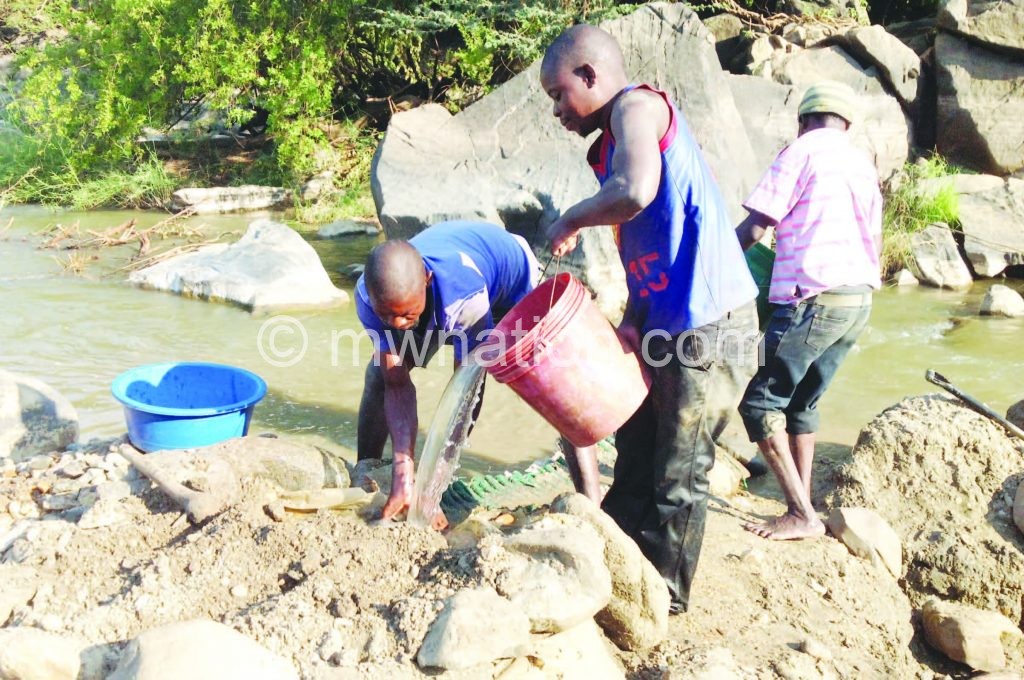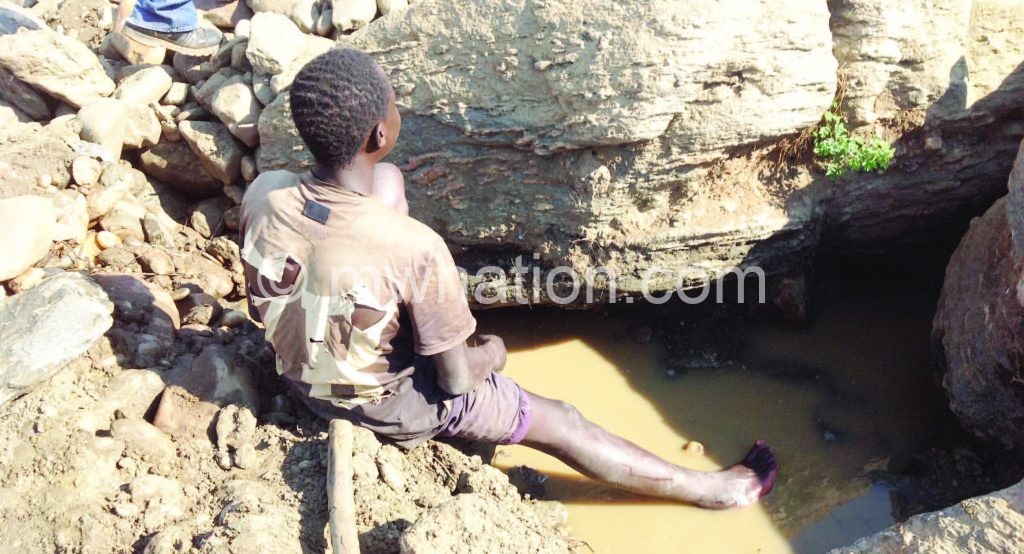Gold rush risks nature
The chirping birds with periodic interjections of domestic animal sounds early in the morning used to wake up Pendwe villagers in Nkhotakota to tend to their small farms.
Since July, however, the rural locality rise to the sounds of artisanal miners panning gold nuggets along Bua River. The quest for gold is on.

All day, dozens of men and women dig out stones from tunnels and take them to grinders. The cut particles are then sieved and panned to separate the precious metal from rocks.
Just a gramme of gold nuggets fetches about K35 000 as artisanal mining grows in this gold-producing country.
During the visit to Bua, Brighton Maseko had just returned from Mozambique where he was working in a goldmine.
“When I heard about the discovery of gold in my area, I chose to come and try my luck,” he says.
Discovery
Until June, Pendwe villagers did not know that there was gold in their midst.

“They were taking a walk, looking for a place rich in gold, when they stumbled into this hole and discovered this mineral,” explains Maseko.
Although gold mining is new in the area, the informal miners are teaching each other ways of extracting the glittering metal.
However, the government does not derive revenue from unlicensed gold mining underway in Nkhotakota, Kasungu, Lilongwe and Machinga.
Mavuto Chilembwe, who worked with a gold-mining company in South Africa from 1978 to 1980, has been searching for the precious metal in rivers for years.
“I have been to Kasungu where artisanal mining is also taking place and now I’m in Nkhotakota. Business is good,” he says, his voice drowned by rock-crushing machines.
Potential for gold
Ex-minister of mining Grain Malunga, says Malawi has “great potential” to become a gold producer.
“I urge the government to seriously support geological surveys and find out from solid sources, not only in rivers,” he says.
Malunga, now coordinator for Chamber of Mines, observes that artisanal and small-scale mining activities has a great impact on the rural economy.
“With their earnings, the miners provide basic amenities for their families, but the government have to see to it that Malawi benefits from its mineral and natural resources by attracting serious investors,” he states.
Quick benefits
Maseko, a father of six, runs sieving equipment made of planks and sacks.
“The ground particles are brought to this equipment. Gold remains in the sieve. We then squeeze out the particles of fine sand by panning using water and get our gold. We can tell it is of good quality with our eyes,” he explains.
Mining activity is rapidly changing the face of Pendwe Trading Centre. Businesspeople have built shops in places that were bushy and abandoned before June.
They sell a variety of essential commodities, especially food and clothes. Mobile money agents abound.
Mary Msiyambiri, an artisanal gold digger, says she pays schools for her children from gold sales.
“When I learnt about the mining activity, I immediately joined in. So far, I saved K300 000 after selling gold ore. I fend for my family,” she says.
Conflict
Despite the benefits, the small centre is experiencing a cultural shock resulting from increased mining activity.
Conflicts between locals and migrant workers are common.
James Mangochi notes that the gold rush has attracted people from as far as Kasungu, Mzimba, Salima and Ntchisi.
Mangochi explains: “Locals feel that they are being denied their rights. Some people from Kasungu are being stopped from getting into the tunnels.”
It is not easy to estimate the amount of gold being extracted from the hole because some ore is transported to faraway sites while locals want it refined there.
Ecosystem threats
Environmentalists argue that unlicensed artisanal mining activities along river, which supplies water to the Bua Irrigation Scheme, poses a threat to the water body.
African Parks’ (AP) park manager Samuel Kamoto notes that the activities along the river are threatening the wildlife. The river passes through Nkhotakota Wildlife Reserve, which AP runs on concession with the government.
He says: “This is an obvious threat to wildlife and natural resources in the reserve and the agricultural activities downstream. The river is breeding site of important fish species, including mpasa.
While the gold diggers brag about the benefits, the river looks polluted. The water flow is discloured.
The gold diggers have blocked the river using sand bags.
Bua Irrigation Scheme president Joseph Nyirenda fears that the mining activities will disrupt livelihoods of villagers surrounding the 300 hectare scheme.
“Our farmers are complaining of low water supply downstream. The sand bags will put our operations in jeopardy,” he says.
Nkhotakota district director of planning and development Ben Tonho says the goldmine is illegal.
He warns the gold diggers against tempering with the wildlife reserve.
He says: “We have advised them on a number of issues, but the district needs to strategise in partnership with the Ministry of Mining.
“That area is under the game reserve. So they don’t have to temper with the protected area as the mining activity is also illegal.”





